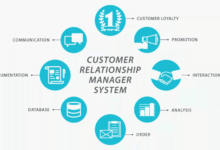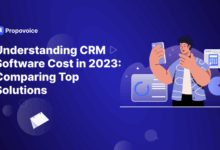AI-Powered CRM Software: Revolutionizing Customer Relationship Management
AI-Powered CRM Software sets the stage for this enthralling narrative, offering readers a glimpse into a story that is rich in detail and brimming with originality from the outset. In today’s dynamic business landscape, harnessing the power of AI in CRM systems is paramount for driving success and enhancing customer experiences.
As we delve deeper into the realm of AI-Powered CRM Software, we unravel a tapestry of innovation and efficiency that is reshaping how businesses connect with their clientele.
Introduction to AI-Powered CRM Software
AI-Powered CRM software refers to Customer Relationship Management systems that leverage artificial intelligence technology to streamline and enhance various aspects of customer interactions and data management. In the modern business landscape, where customer experience plays a crucial role in determining success, AI-powered CRM software has become a game-changer for organizations of all sizes.
Significance of AI in CRM
Artificial intelligence revolutionizes customer relationship management processes by automating repetitive tasks, analyzing vast amounts of data to derive actionable insights, and personalizing customer interactions at scale. By harnessing AI capabilities, businesses can gain a deeper understanding of their customers’ preferences and behaviors, leading to more targeted marketing strategies and improved customer satisfaction.
- Enhanced Data Management: AI-powered CRM systems can effectively organize and analyze large volumes of customer data in real-time, enabling businesses to make data-driven decisions and anticipate customer needs.
- Personalized Customer Interactions: AI algorithms can segment customers based on their preferences and behavior, allowing businesses to deliver personalized interactions, recommendations, and offers tailored to individual customers.
- Improved Efficiency: Automation of routine tasks such as data entry, lead scoring, and follow-up communications frees up valuable time for sales and marketing teams to focus on high-value activities, ultimately increasing productivity and revenue.
Features of AI-Powered CRM Software
AI-Powered CRM software comes with a range of features that revolutionize customer relationship management by leveraging artificial intelligence technology to enhance efficiency and effectiveness.
Automated Task Management
AI assists in automating various tasks within CRM systems, streamlining processes and saving time. For instance, AI can automate data entry, schedule appointments, and send personalized emails to customers based on their interactions with the system.
Enhanced Data Analysis
AI improves data analysis within CRM software by quickly analyzing large volumes of data to provide valuable insights. By identifying patterns and trends, AI enables businesses to make data-driven decisions and personalize customer interactions based on preferences and behaviors.
Intelligent Customer Interactions
AI enhances customer interactions by enabling chatbots to provide instant responses to customer queries, improving overall customer satisfaction. Additionally, AI-powered CRM software can predict customer needs and preferences, allowing businesses to offer personalized recommendations and solutions.
Implementation of AI in CRM Systems
Implementing AI in CRM systems involves a strategic process to harness the power of artificial intelligence for enhancing customer relationship management. Let’s delve into the details of integrating AI into CRM systems, common challenges faced during implementation, and best practices for successful AI deployment.
Integrating AI into CRM Systems
- Identify objectives: Begin by defining clear objectives for implementing AI in CRM, whether it’s improving lead management, enhancing customer service, or boosting sales forecasting.
- Data integration: Ensure seamless integration of AI algorithms with existing CRM data to leverage insights for personalized customer interactions.
- Training AI models: Train AI models with relevant customer data to improve accuracy in predicting customer behavior and preferences.
- Automating processes: Implement AI-powered automation for repetitive tasks like data entry, lead scoring, and customer segmentation.
Common Challenges in Implementation
- Data quality issues: Poor data quality can lead to inaccurate AI predictions, making it essential to clean and standardize data before AI implementation.
- Lack of expertise: Limited expertise in AI technologies among CRM teams can hinder successful implementation, emphasizing the need for training and upskilling.
- Integration complexity: Integrating AI into existing CRM systems may pose technical challenges, requiring seamless integration and compatibility testing.
- Change management: Resistance to change from employees accustomed to traditional CRM methods can impede the adoption of AI-powered CRM software.
Best Practices for Successful AI Deployment
- Collaboration: Foster collaboration between AI experts, CRM teams, and stakeholders to align AI initiatives with business goals.
- Pilot testing: Conduct pilot tests to evaluate the performance of AI algorithms before full-scale implementation, ensuring optimal results.
- Continuous monitoring: Regularly monitor AI performance metrics and customer feedback to fine-tune algorithms and enhance CRM processes.
- Training and support: Provide comprehensive training and support to CRM teams to maximize the benefits of AI technology and drive adoption.
Impact of AI on Customer Relationship Management
Artificial Intelligence (AI) has revolutionized Customer Relationship Management (CRM) by enhancing customer experience and engagement. By leveraging AI technologies, businesses can better understand their customers’ needs, preferences, and behaviors, leading to more personalized interactions and improved customer satisfaction.
Enhanced Customer Experience and Engagement
- AI-powered CRM software can analyze vast amounts of data in real-time to predict customer behavior and preferences.
- By providing personalized recommendations and suggestions, AI helps businesses tailor their communication with customers, leading to higher engagement rates.
- Automated chatbots powered by AI can offer immediate assistance to customers, enhancing their overall experience with the brand.
Personalization of Customer Interactions and Marketing Strategies
- AI enables businesses to create personalized marketing campaigns based on individual customer data and behavior patterns.
- Through AI algorithms, businesses can segment their customer base and deliver targeted messages, increasing the effectiveness of marketing efforts.
- AI helps in predicting customer needs and offering relevant products or services, leading to higher conversion rates and customer retention.
Future Trends of AI-Powered CRM Software
- AI in CRM systems is expected to continue evolving, with more advanced predictive analytics and machine learning capabilities.
- Integration of AI with other emerging technologies like Internet of Things (IoT) and Augmented Reality (AR) will further enhance customer engagement.
- AI-powered virtual assistants will play a more significant role in handling customer queries and providing personalized support in real-time.
Conclusion
In conclusion, AI-Powered CRM Software emerges as a game-changer in the realm of customer relationship management, paving the way for personalized interactions, streamlined processes, and unparalleled insights. As businesses continue to embrace AI technology, the future holds a promise of even more seamless and effective CRM solutions.


